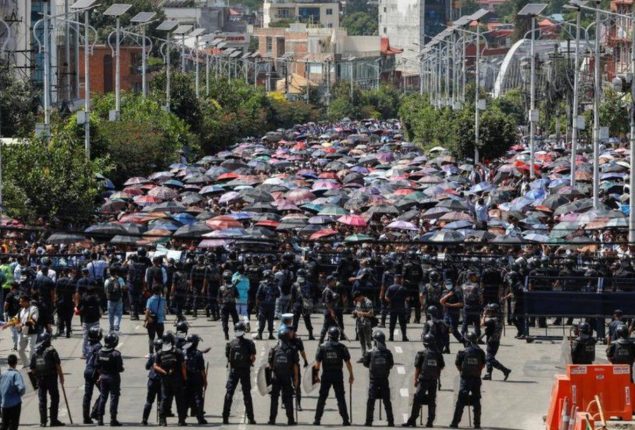Justin Trudeau repeats allegation against India amid row
Trudeau: Credible reasons to believe Indian agents involved in Sikh separatist's murder...

Teachers strike over education reform shuts down schools in Nepal
In Nepal, a significant teachers’ strike has now reached its third day, causing widespread disruptions to the education of millions of students in public schools.
Approximately 110,000 teachers are engaged in this protest, which is directed against an education reform bill currently under consideration in parliament.
Their objections revolve around two key aspects of the bill: first, the proposals to grant local governments authority over schools, and second, the prohibition on teachers participating in organizations with political affiliations.
On Thursday, a considerable number of protesters marched toward the parliament building in Kathmandu, the capital city.
During this march, clashes occurred as anti-riot police, armed with batons, pushed back the demonstrators attempting to breach a steel barricade.
Amidst this ongoing unrest, students and parents are urging a resolution to the situation to allow classes to resume as soon as possible.
“How can my teachers play against my future?” said 16-year-old Simran Bhatta Acharya, who is preparing for national examinations.
Sabirti Acharya, Simran’s mother, mentioned that she has opted to take several days off from her job to care for her daughter.
“How long can I do that? Teachers should fight for their rights without taking away the children’s right to education,” she said.
The teachers are protesting a provision in the bill that bars them from joining organizations with political affiliations.
Nepali teachers were notably involved in the country’s fight for democracy. The country held its first parliamentary elections in 1959 and political parties have long been interested in recruiting teachers as activists.
However, some education experts argue that teachers’ involvement in politics undermines education quality and have argued for party politics to be banned in these institutions.
The teachers are also expressing their objections to proposals that would grant local governments authority over schools, a responsibility they argue should remain under the purview of the federal government.
In 2015, a constitutional amendment was passed, transferring the governance of certain public institutions like schools and hospitals to local authorities.
This change was implemented in response to worries about the centralization of power and resources in Kathmandu.
However, after eight years, some educators are voicing dissatisfaction, claiming that local officials lack the necessary expertise to effectively manage schools, leading to a decline in the quality of education.
Nevertheless, many Nepalis are in favor of the proposed bill, as they believe it will enhance accountability within the teaching profession.
The teachers have presented a list of demands to the government, including a request for decisions regarding promotions and transfers to be handled at the provincial level rather than by local municipalities. Additionally, they are seeking increased wages, the establishment of a council for overseeing teacher training, and opportunities for contract-based teachers to secure permanent positions.
Kamala Tuladhar, the president of the Nepal Teachers’ Association, alleges that the government failed to uphold its prior “commitment” to address teachers’ concerns.
“But many things were not addressed, so we were forced to protest,” she said.
Nepal’s acting Prime Minister Purna Bahadur, however, said the teachers started protesting “without informing the government about their demands”.
Government officials held meetings with the protesting teachers on both Thursday and Friday to engage in discussions regarding their grievances. Authorities characterized these talks as “constructive,” although they concluded without resolving.
The teachers have issued a warning that they will persist with their demonstrations if their demands are not addressed.
Kamal Giri, the press adviser of Narayankaji Shrestha (deputy Prime minister) told the BBC that the acting PM has “assured that the government has no intention of undermining the teachers’ morale”.
To stay informed about current events, please like our Facebook page https://www.facebook.com/BOLUrduNews/.
Catch all the World News, Breaking News Event and Latest News Updates on The BOL News
Download The BOL News App to get the Daily News Update & Follow us on Google News.